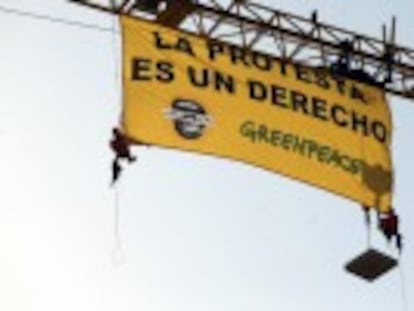Five things Spain¡¯s ¡®gag law¡¯ will stop you doing from today
Protesting in front of Congress and other ¡°risky¡± actions carry fines of up to €600,000


The countdown has ended. The government¡¯s new Citizen Safety Law went into effect on Wednesday despite widespread rejection from opposition parties and many sections of society.
¡°Demonstrations will be freer because they will be protected from violent elements,¡± claims the ruling Popular Party (PP).
But the opposition accuses the government of creating ¡°a police state¡± because law enforcement officers will have the power to hand out administrative sanctions that were, until now, the sole preserve of judges.
The following are five things that will be limited by the new ¡°gag law,¡± as its critics call it.
Demonstrating near Congress and the Senate
The law considers an offense any ¡°serious perturbation of citizen security¡± in front of Congress, the Senate or regional assemblies, even if the legislature is not in session at the time. ¡°But what constitutes perturbing citizen security?¡± wonders Greenpeace, denouncing that this decision will now be in the ¡°arbitrary¡± hands of the police. This measure was introduced at the time when social protest movements such as Surround Congress arose in Spain.
Taking photographs of police officers
Video cameras have become commonplace at protests in recent years. And social networks are being used to disseminate recordings that have captured police abuse on more than one occasion, and have later been used as evidence against officers. This will be harder starting on July 1, as the Citizen Safety Law imposes penalties on ¡°the unauthorized use of images or personal or professional information¡± about police officers ¡°that could endanger their personal safety or that of their families, of protected facilities or endanger the success of a police operation.¡± Amnesty International has complained about this, noting that journalists and other individuals¡¯ private recordings have occasionally helped report the use of excessive force by the police.
Stopping a home eviction

¡°In the name of citizen security, the new legislation bans and criminalizes such common practices as stopping a home eviction,¡± says PAH, a support association for home loan borrowers in trouble. The PP once went so far as to suggest ties between PAH and the Basque terrorist group ETA. The new law will make PAH¡¯s actions harder, as the police will be able to sanction individuals who ¡°obstruct any authority, public employee or official corporation in the exercise of administrative or judicial agreements or resolutions.¡±
Protesting from above
As per the new legislation, police officers may slap fines on anyone found ¡°climbing buildings or monuments without authorization when there is a clear risk of damage to persons or goods.¡± This article seems tailor-made to stop the kind of public campaigns staged by Greenpeace, this organization notes. ¡°In this case, the offense is committed without the need for disturbing the peace or harming citizen security,¡± notes a Greenpeace release. It will be enough for the police to consider that ¡°a risk¡± exists.
Peaceful resistance and sit-ins
The new law means the end of peaceful resistance, say non-profit groups. The police will be able to fine anyone who refuses to break up gatherings and demonstrations in public places after ¡°the relevant authority¡± has ordered it.
Fines of €100 to €600,000
Under the new law, minor offenses will carry fines of €100 to €600, while serious offenses are sanctioned with penalties of €601 to €30,000 and very serious offenses between €30,001 and €600,000.
Tu suscripci¨®n se est¨¢ usando en otro dispositivo
?Quieres a?adir otro usuario a tu suscripci¨®n?
Si contin¨²as leyendo en este dispositivo, no se podr¨¢ leer en el otro.
FlechaTu suscripci¨®n se est¨¢ usando en otro dispositivo y solo puedes acceder a EL PA?S desde un dispositivo a la vez.
Si quieres compartir tu cuenta, cambia tu suscripci¨®n a la modalidad Premium, as¨ª podr¨¢s a?adir otro usuario. Cada uno acceder¨¢ con su propia cuenta de email, lo que os permitir¨¢ personalizar vuestra experiencia en EL PA?S.
En el caso de no saber qui¨¦n est¨¢ usando tu cuenta, te recomendamos cambiar tu contrase?a aqu¨ª.
Si decides continuar compartiendo tu cuenta, este mensaje se mostrar¨¢ en tu dispositivo y en el de la otra persona que est¨¢ usando tu cuenta de forma indefinida, afectando a tu experiencia de lectura. Puedes consultar aqu¨ª los t¨¦rminos y condiciones de la suscripci¨®n digital.









































